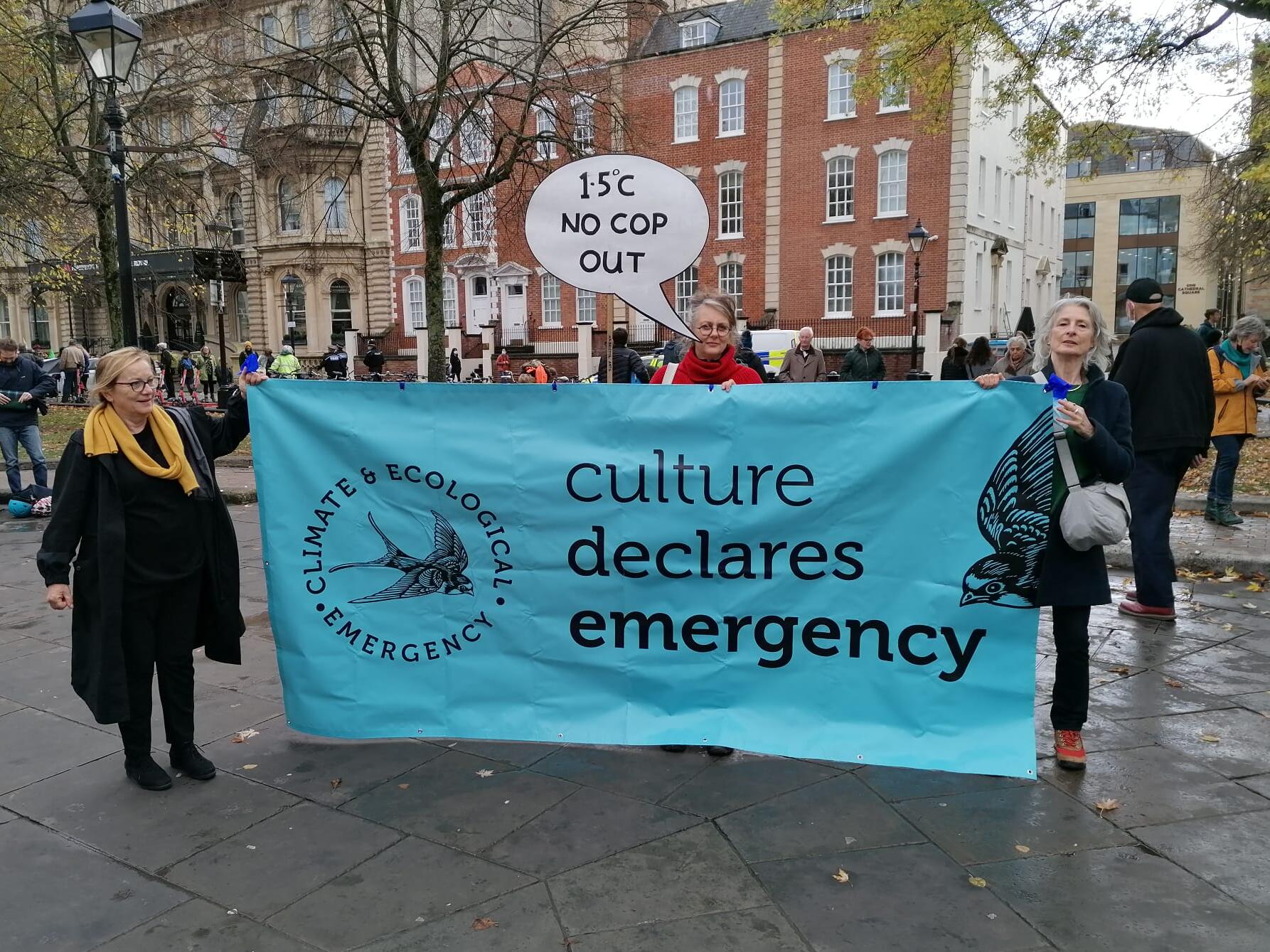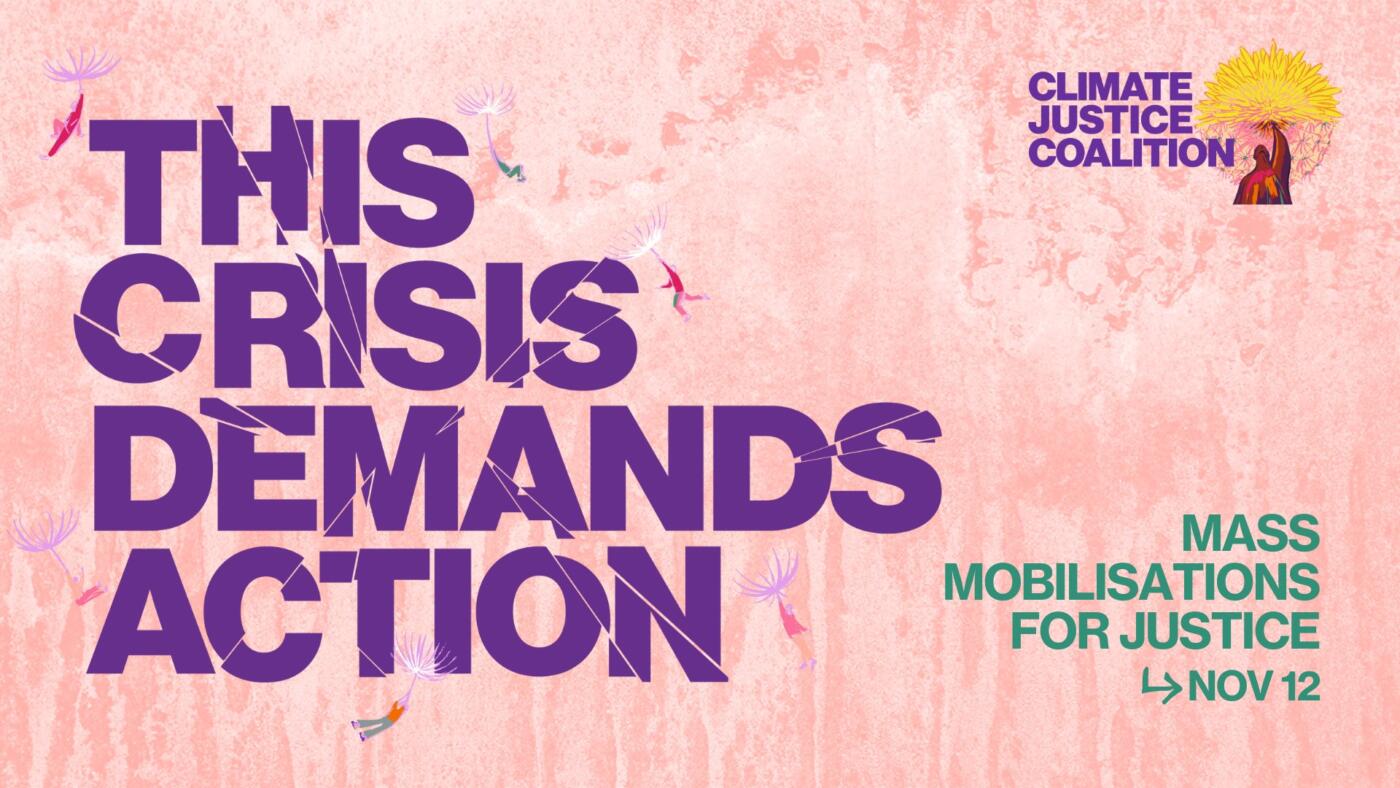Making Sense of COP27

We want to see the Cultural sector creating a regenerative future that protects the planet and sustains everyone, everywhere. Our Vision, Mission and Values outline how we go beyond declaring emergency to Tell the Truth, Take Action and Seek Justice in our local hubs in the UK and through international hubs and alliances. This is ongoing creative work. We support global negotiations for climate change mitigation, adaptation and justice. However, we have some ethical concerns about COP27:
- The failure of the COP process up to this point. No Climate COP has addressed stopping the extraction of fossil fuels, and negotiations do not account for the imbalance of power between the highest emitting nations of the Global North and the nations most affected by impacts and historic exploitation in the Global South. Multiple links have been categorically proven between a range of extractive activities and the global impacts of a heating planet. We support the voices and demands of the COP27 Coalition for decolonising the economy and reparative climate finance.
- The choice of Egypt as a host country despite the scale and severity of its ongoing human rights crisis, is counterproductive to both the credibility of COP27, and the prospects of addressing the human rights situation. Oil companies such as BP are closely involved with the Egyptian government. Tens of thousands of people have been detained for expressing their voice or organising protest. Read this piece by Naomi Klein for more background. Read this account of a protest at the British Museum in support of British citizen Alaa abd-el Fattah at the BP-sponsored British Museum.
- Artists and cultural practitioners are repressed in Egypt, for example, with a law that gives music, cinema and drama syndicates the right to crack down on practices and content deemed unacceptable. Artists are prevented from organising public events, and several of Egypt’s political prisoners are artists.
It’s important that we in the Cultural sector use the global profile of COP27 to encourage critical thinking, to raise awareness of the role of Culture in climate action, and the ethical issues noted above. We encourage you to use whatever audiences, skills and ideas you have to amplify the voices of those most affected and excluded from negotiations.
The Cultural industries in countries such as the UK, where Culture Declares has originated, play a role in ongoing colonisation across the world and are invested in systems that privilege white power and oppress other cultural voices. We are on a journey to better understand, unpack and help to dismantle these structures and systems as urgent action in the struggle for Climate Justice. Culture Declares will be using the period of COP27 (6-18th November) to do this, via social media and our local Hubs and we invite you as declarers and supporters to join in too.
We have written an information resource below for you to Make Sense of COP27 – with links about the science, the ethical issues, the campaign groups and the cultural events around the event, and the provocations we will be using over the following weeks which we invite you to follow along and use to engage your own audiences, online and offline.
What is COP27?
The 27th United Nations Climate Change Conference (COP27) will take place in Sharm El-Sheikh, Egypt, from November 6th – 18th. The Climate COP (Conference of Parties) is an annual conference where governments meet to address the climate emergency through negotiations under the UN Climate Convention, Kyoto Protocol and Paris Agreement. It is also an opportunity for civil society (including Culture), the media and others to pressure governments, exchange experiences, and build solidarity in the fight against climate breakdown and injustice. This year’s meeting follows COP26, which took place in Glasgow in 2021, where nations failed to take the steps needed as explained in this brief published by civil society.
Current climate assessments
These reports were published before the Climate COP27 meeting in Egypt, November 2022:
- Climate Action Tracker: an update to the dashboard on pledges vs emissions shows UK’s commitment is not sufficient to the Paris agreement, especially not on reparative finance and justice.
- UNFCCC have now re-assessed all climate plans. They find: If all pledges were met global temperatures will rise by 2.5C. Emissions will increase by 10.6% by 2030 compared to 2010. UN climate scientists say emissions need to fall by 45% by 2030.
- State of Climate Action from the World Resources Institute: No transformations in any country or sector are meeting their 2030 targets
- Emissions Gap from UNEP; the international community is falling far short of the Paris goals, with no credible pathway to 1.5°C in place. Only an urgent system-wide transformation can avoid climate disaster.
- World Energy Outlook from the IEA: conflict in Ukraine has led to an energy crisis with $2 trillion in windfall profits to fossil fuel companies and vast economic shortfall for Governments and people. It underlines the risks of fossil fuel dependence.
- Lancet Countdown health & climate; climate threatens health & survival of people in every part of the world, rise in infectious diseases, 2/3rds rise in heat deaths.
- Mapping the road to 1.5C from the IISD; developing any new oil & gas extraction is incompatible with limiting warming to 1.5C; there’s a global government investment gap of $450 million p.a. in alternatives.
- UNFCCC, Global Carbon Budget 2022 (out 11 Nov).
If you need to provide authoritative evidence on the science, use and share Climate NASA / Evidence.
Campaigns and coalitions for COP27
Climate Justice: Global Day of Action, November 12th

Nov 12 will see mass mobilisations across the country and put thousands of people on the streets to demand Climate Justice in solidarity with the Global Day of Action called by Egyptian groups at COP27. From the cost of living crisis, to floods in Pakistan and Shell’s criminal profits – we will come together as one movement to demand justice.
How you might support this:
- Find out what’s happening in your local area and add creative support
- Support and promote one of the movements or links in this resource
- Use the provocations below and start a conversation on social media or in person.
Movement of Egyptian, African, Arab and international civil society demanding climate justice at COP27. This must be a time to reset the multilateral system to weed out the inequities embedded in existing frameworks, advance climate justice, and achieve real systems change. The headings of their demands are:
- Decolonise the economy and development
- Repay climate debt and deliver the money
- No false solutions – real zero not ‘net zero’, not geo-engineering or carbon markets
- Build global solidarity, peace and justice.
A group of independent Egyptian human rights organisations have created an ad-hoc coalition to coordinate advocacy around key civic space demands to leverage and influence the existing mobilisation of the global climate movement. Includes a petition and graphic assets for social sharing, calling for the release of political prisoners in Egypt. Read more.
Cairo Institute for Human Rights Studies
This website provides detailed background to the human rights situation in Egypt, which has worsened since 2013 under President al-Sis, with torture, imprisonment and death sentences of political protestors. Egyptian NGOs have been screened, with many refused access to COP27.
Advice from Egyptian cultural practitioners
By Lewis Coenen-Rowe, Creative Carbon Scotland
Useful insights from interviews with practitioners in Egypt about how environmental and social justice issues are affecting Egyptians, and ways to engage with people there.
Cultural programmes at COP27
A programme of several events led by arts and culture from North Africa and beyond. A gathering of people from across borders and boundaries, coming together in celebration, catharsis and commitment to create tangible and long-lasting change.
Culture at COP27 – Climate Heritage
Amplifying Arts, Culture and Heritage Voices
The Climate Heritage Network has a working group for COP27, which aims to:
- Mainstream art, culture, and heritage perspectives into climate change policymaking.
- Support climate action by cultural voices at all levels and in turn drive engagement by wider audiences and the public.
- Build capacity within cultural actors for durable, ambitious climate action year-round.
- Grow the Climate Heritage Network in order to develop more effective international culture-climate collaboration at COP28 in Abu Dhabi and beyond.
The webpage includes a manifesto, a schedule of events and biographies of speakers. Particularly useful is a guide to issues, with some provocation cards you can use on social media: https://www.climateheritage.org/cop27-issues
The Scotland-based coalition that organised cultural fringe programmes for COP26 in Glasgow is offering a programme of events for COP27. This includes a series of creative assemblies across Scotland.
Climate Outreach is calling on governments to adopt robust public engagement initiatives, including use of more visuals, accessible data, creative approaches and culture-informed frames. They are running and participating in a number of events.
Provocations for COP27
We will be sharing these provocations across our Facebook, Twitter and Instagram channels following the schedule below.
Provocation 1 (6th – 9th November)
The voices of artists are often among the first to be silenced when civic space is restricted. In Egypt, the COP Civic Space Coalition is highlighting the necessity of open and free civic space to achieve climate justice. Artistic voice, as part of and alongside protest, is repressed in many countries including ‘petrostates’ such as Saudi Arabia, Russia and Egypt. How can we debate and support artistic freedom and global justice within our own spheres of influence? See the Free Alaa campaign, and Pen International.
Provocation 2 (10th – 13th November)
Ugandan activist Vanessa Nakate said “Right now, people are facing the worst famine in decades in East Africa, driven by the longest period of drought in living memory. Historically, Africa is responsible for less than four percent of global emissions, but Africans are suffering some of the most brutal impacts of the climate crisis. We need financial support to cope with the loss and the damage we’re experiencing across the continent. We need polluters to compensate for the destruction they’ve caused.” How can we use the power of Culture to help address Loss and Damage?
Provocation 3 (14th – 17th November)
The fossil fuel industry has been profiting $3 billion a day for the past 50 years. Cultural organisations sponsored by fossil fuel companies say that we need to engage with them from a position of friendship. What would you ask these companies to do?
For example, look at this proposal that oil companies are funded to develop geothermal energy. Or, could they change the structure of their companies so that they aren’t beholden to shareholders? What ideas do you have? See Culture Unstained for background.
Provocation 4 (18th – 21st November)
The UN has said that for any chance of stabilising the climate, we need fundamental changes to our energy, food and financial systems. What do you think are the biggest levers for the essential change, and what are you prepared to do to make that happen? How might you draw on creative and cultural work or resources? See Doughnut Economics and Degrowth for some ideas.